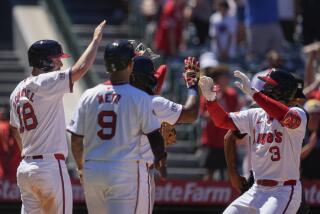Angels’ Offense Goes From Feast to Famine
- Share via
OAKLAND — The turn of events from Sunday to Monday, when the Angels went from a six-hit effort in a loss to Texas to a 20-hit effort in a win over the Rangers, left Angel Manager Terry Collins perplexed.
“When someone can explain this game to me, I’d be happy to listen,” Collins said. “That’s why this game is so great, because every night it’s something different.”
Collins wouldn’t have minded the same old story Tuesday night, though. An Angel team that had made a habit of racking up double-figure hit totals in Texas was stymied by the Oakland Athletics, 3-2, in front of 5,377 fans who were engulfed by the Oakland Coliseum.
Mike Oquist, a right-hander who was recalled from triple-A Vancouver on Tuesday, gave up only one run on four hits in six innings, and Billy Taylor closed out the Angels in an intrigue-filled ninth for the save.
Taylor opened the inning by hitting Matt Walbeck with a pitch, and Collins inserted Orlando Palmeiro as a pinch-runner. Andy Sheets fouled off a bunt attempt, but on the second pitch, with Sheets squaring to bunt again, Palmeiro took off for second.
The A’s, obviously expecting a hit and run, pitched out, and catcher Mike Macfarlane easily threw out Palmeiro at second. Sheets and Jeff Huson then grounded out to end the game.
The question: Why was Palmeiro running on a sacrifice attempt? The answer: He shouldn’t have been running. Another question: Why did the A’s pitch out? Did they think third-base Coach Larry Bowa had flashed a steal or hit-and-run sign?
“He missed the sign, it was a bunt,” a perturbed Bowa said of Palmeiro. “They must have thought it was a hit and run. They don’t know the signs, and we don’t know the signs.”
Collins was obviously steamed about the play afterward, but he refused to point fingers. Asked if Palmeiro missed the sign, he said: “It doesn’t matter. He’s out.”
So ended a frustrating game in which the Angels actually outhit the A’s, 9- 7, but couldn’t come up with enough big hits when they needed them.
For instance, the Angels, trailing, 3-1, nearly tied it with a two-out rally in the eighth, as Tim Salmon and Garret Anderson singled against reliever Doug Jones and Troy Glaus grounded an RBI double past first baseman Jason Giambi, Anderson holding at third. But Todd Greene, swinging at the first pitch, flied out to left to end the inning.
Angel knuckleballer Steve Sparks (0-2) gave up three runs--all in the first inning--on seven hits in six innings, striking out seven.
“It took me two or three innings to feel comfortable, to get locked in with the knuckleball,” Sparks said. “I didn’t have a good feel for it--the ball seemed hard and slick--and I tried to get by with my other stuff the first three innings.”
The first inning has not been kind to Sparks in his first two starts. Last Thursday, he gave up a two-run homer to Cleveland’s Roberto Alomar in the first en route to a 9-1 loss, and Tuesday night, the A’s roughed him up.
Tony Phillips walked to open the inning and Jason McDonald singled Phillips to third. McDonald took second on a passed ball, and after Giambi struck out, Matt Stairs ripped a two-run single to right.
John Jaha singled to left, and Stairs took third when Sheets, the Angel shortstop, failed to field Sparks’ pickoff attempt at second. Stairs eventually scored on a wild pitch for a 3-0 lead.
Unlike the Cleveland game, Sparks didn’t fold after a rocky first. He retired three of four batters in the second and slipped out of a second-and-third, one-out jam in the third, getting Eric Chavez to pop to short and striking out Macfarlane.
The Angels didn’t so much manufacture their first run as they did fabricate it. Greene opened with a routine fly ball to left field, but Grieve lost it in the lights, and it dropped for a gift double. Greene took third on Walbeck’s grounder to second and scored on Sheets’ groundout.
But they didn’t score again until the eighth.
“We had nine hits, we just didn’t get any with runners in scoring position,” Collins said. “When he had runners on, they made good pitches.”
More to Read
Go beyond the scoreboard
Get the latest on L.A.'s teams in the daily Sports Report newsletter.
You may occasionally receive promotional content from the Los Angeles Times.







